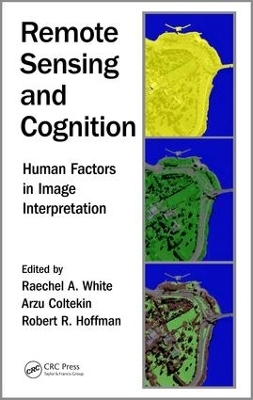
Remote Sensing and Cognition
Crc Press Inc (Verlag)
978-1-4987-8156-5 (ISBN)
Written by leaders in the field, this book provides answers to the host of questions raised at the nexus of psychology and remote sensing. Academics and researchers with an interest in the human issues surrounding the use of remote sensing data will find this book to be an invaluable resource. The topics covered in this book are useful for both the scientific analysis of remote sensing imagery as well as the design and display of remote sensing imagery to facilitate a variety of other tasks including education and wayfinding.
Features
Brings together remote sensing, environmental, and computer scientists discussing their work from a psychological or human factors perspective
Answers questions related to aesthetics of scientific visualization and mathematical analysis of perceptible objects
Explains the perception and interpretation of realistic representations
Provides illustrative real-world examples
Shows how the features of display symbols, elements, and patterns have clear effects on processes of perception and visual search
Raechel Bianchetti received her doctoral degree from the Pennsylvania State University. Her doctoral research explored the cognitive processes and knowledge that facilitate remote sensing image interpretation and the use of geovisual analytic approaches to facilitate insight generation from imagery. Prior to that, she studied remote sensing at the University of Idaho for a variety of physical science applications including geological mapping on Mars and forests in Idaho. Robert R. Hoffman, Ph.D. is a Senior Research Scientist, IHMC, Pensacola FL. Hoffman is a recognized world leader in cognitive systems engineering, Expertise Studies, and Human-Centered Computing. He is a Fellow of the Association for Psychological Science, Fellow of the Human Factors and Ergonomics Society, Senior Member of the Association for the Advancement of Artificial Intelligence, and a Fulbright Scholar. He has been Principal Investigator, Co-Principal Investigator, Principal Scientist, Senior Research Scientist, Principal Author, or Principle Subcontractor on over 60 grants and contracts totaling nearly $12M. He has led efforts including large, multi-partner, multi-year grant collaborations, contracted alliances of university and private sector partners, and multi-university research initiatives. His Ph.D. is in experimental psychology from the University of Cincinnati, where he received McMicken Scholar, Psi Chi, and Delta Tau Kappa Honors. Following a Postdoctoral Associateship at the Center for Research on Human Learning at the University of Minnesota, he joined the faculty of the Institute for Advanced Psychological Studies at Adelphi University. He pioneered the study of methods for eliciting the knowledge of domain experts. Hoffman has been recognized internationally in psychology, remote sensing, human factors engineering, and artificial intelligence—for his research on the psychology of expertise, the methodology of cognitive task analysis, HCC issues for intelligent systems technology, and the design of cognitive work systems. Hoffman is a Co-Editor for the Department on Human-Centered Computing in IEEE: Intelligent Systems. He is Editor for the book Series, "Expertise: Research and Applications." He was a co-founder of The Journal of Cognitive Engineering and Decision Making.
Cognitive and Perceptual Processes in Remote Sensing Image Interpretation. Characteristics of Geospatial Photographs in Constructing Human Spatial Knowledge. Intersectional Perspectives on the Landscape Concept: Art, Cognition, and Military Perspectives. Head in the Clouds, Feet on the Ground: Applying Our Terrestrial Minds to Satellite Perspectives. Eye-Tracking Evaluation of Non-Photorealistic Maps of Cities and Photo-Realistic Visualization of an Extinct Village. Designing Geographic Information for Mountains: Mixed Methods Research. The Human Factors of Geospatial Intelligence. Employing Ontology to Capture Expert Intelligence within GEOBIA: Automation of the Interpretation Process.
| Erscheinungsdatum | 13.06.2018 |
|---|---|
| Zusatzinfo | 12 Tables, black and white; 14 Illustrations, color; 35 Illustrations, black and white |
| Verlagsort | Bosa Roca |
| Sprache | englisch |
| Maße | 156 x 234 mm |
| Gewicht | 399 g |
| Themenwelt | Informatik ► Grafik / Design ► Digitale Bildverarbeitung |
| Naturwissenschaften ► Geowissenschaften ► Geografie / Kartografie | |
| Technik ► Elektrotechnik / Energietechnik | |
| Technik ► Umwelttechnik / Biotechnologie | |
| ISBN-10 | 1-4987-8156-X / 149878156X |
| ISBN-13 | 978-1-4987-8156-5 / 9781498781565 |
| Zustand | Neuware |
| Informationen gemäß Produktsicherheitsverordnung (GPSR) | |
| Haben Sie eine Frage zum Produkt? |
aus dem Bereich


